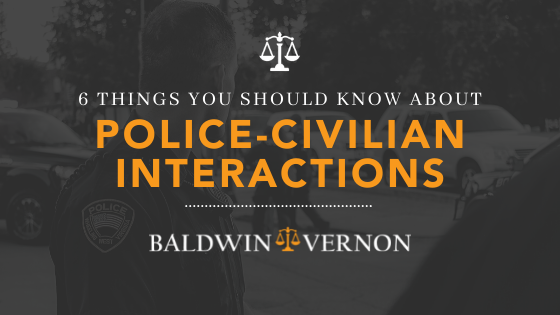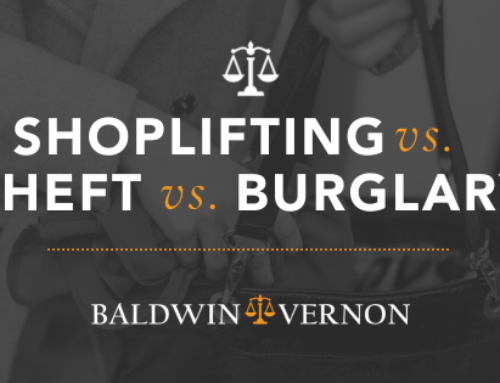While serving as enforcers of the law, police officers are not above the law themselves. When they fail to abide by the rules governing their actions, or infringe upon the civil rights of citizens, they can be held accountable.
As an example, if a police officer is guilty of domestic violence, hit and run, or any other crime, a judge can sentence the officer to the same punishments as a civilian would face. The officer can serve time in prison, pay fines, and be on probation. This can apply to an officer’s actions on-duty as well.
Arresting a person is a powerful tool for law enforcement. Arrests can be made when an officer witnesses a violation of the law, or if they have probable cause to suspect a crime has been committed by an individual. This does not mean that every arrest is valid however.
In a 2018 case in Providence, KY, an officer was found guilty of wrongful arrest. The individual had arrested someone who had attempted to file several complaints against the police officer. Because the officer did not have probable cause to believe a crime had been committed, the officer violated the person’s Fourth Amendment rights in arresting them.
False arrests can violate a person’s Fourteenth Amendment which is the right of due process, as well as the person’s Eighth Amendment right not to be subject to cruel or unusual punishment.
If a police officer arrests a person without cause, any evidence obtained pursuant to the wrongful arrest is inadmissible in court. The exclusionary rule prohibits prosecutors from using evidence obtained during an unlawful or false arrest against a defendant in court. Without that evidence, there may not be a valid case against the person.
The exclusionary rule protects individuals from having their rights violated. It discourages law enforcement agencies from using arrests as an unlawful way to obtain more evidence when they do not have enough evidence or probable cause to support an arrest. Other forms of police misconduct could lead to the use of the exclusionary rule.
In addition to false arrests, there is a long list of things that law enforcement officers cannot do legally while performing their jobs. Individuals need to understand their legal rights when interacting with police officers.
Examples of actions taken by police officers that may be considered wrongful or illegal:
- Police officers cannot conduct searches and seizures without a warrant or probable cause, unless the person is already under arrest. If the arrest is false, any evidence obtained typically falls under the exclusionary rule.
- Before stopping a vehicle, the officer must have reasonable cause to believe a crime has been or is being committed.
- If the evidence is in plain sight, police officers can search a vehicle or person without consent or a search warrant. However, there could be a valid defense regarding whether the evidence was in plain sight.
- Officers can lie to individuals. But, they are not allowed to claim they have a warrant when they do not have a warrant or say that they are specific individuals, such as a priest, to obtain a confession. They also cannot lie about how the legal system works.
- Police officers cannot use bribery to obtain evidence or use intimidation to obtain a confession.
- Police misconduct includes a wide variety of actions that law enforcement officers may use during an investigation, encounters with citizens, or arrest. Surveillance abuse, planting evidence, racial profiling, excessive force, corruption, false imprisonment, and assault are just a few more examples of illegal acts committed by police officers.
If you believe your Constitutional rights were violated or a police officer is guilty of misconduct, contact a criminal defense attorney.
Arguing with a police officer or resisting arrest can give an officer probable cause for the arrest. Police are permitted to pat you down to ensure that you are not carrying a dangerous weapon.
However, do not consent to a search of your person, belongings, vehicle, or home. You may not be able to prevent a police officer from conducting an unlawful search, but verbally objecting to the search before and after it begins can help you preserve your legal rights in a later proceeding.
WITH THAT SAID IT IS IMPORTANT TO REMEMBER THAT: In the state of Missouri it is illegal for you to resist an illegal arrest. So if you believe you are being arrested illegally, you still have to cooperate and comply with the officer’s orders. Tell your lawyer later all of the details about why you believe your arrest is illegal, and if you are correct and the evidence supports you, then things will work out the way they are supposed to. DO NOT make the decision yourself in the moment that the arrest is illegal.
If you are arrested, remain silent except for asking for an attorney. A criminal defense attorney can help you determine if the law enforcement officer did anything illegal. Your attorney also assists you in formulating a defense strategy that may result in a dismissal of charges and compensation for damages if the police officer is guilty of misconduct or wrongdoing. If you or a loved one are unsure if rights have been violated, call Baldwin & Vernon at (816) 842-1102 or visit us at https://baldwinvernon.com/ to begin discussing your potential case.







